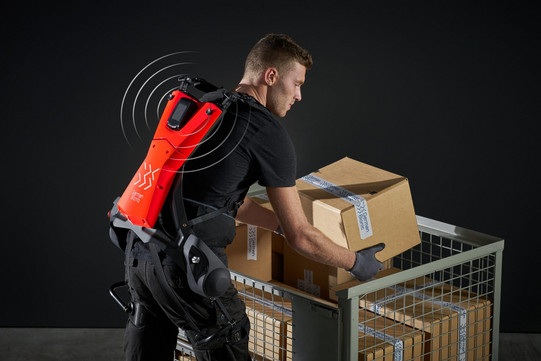SyNExo

Systematic use of exoskeletons in production and logistics
(Project duration: April 2021 to January 2023)
Problem
Musculoskeletal disorders (MSDs) are the most common cause of physical functional limitations, chronic pain and loss of quality of life worldwide, regardless of age group. On top of that, they are the number one reason for incapacity to work in Germany. MSDs cannot only be attributed to societal factors, but also the occupational group has a significant influence on the risk of disease. In particular, men in occupations with manual tasks in production and logistics have a high risk of occupational diseases. In addition to the health impairments of employees, MSDs also cause high costs in the health care system as well as for companies.
Ergonomic workplace design is therefore essential to prevent these injuries. Especially in view of the demographic change, this aspect gains additional importance in order to enable employees to work in a healthy way until retirement age. New technologies offer a starting point for ergonomic relief; for example, collaborative robots can support human workers. Nevertheless, not all activities can be automated in a technically or economically feasible way, so manual activities are still required. This is particularly true for processes with small quantities, mobile manual activities and large components. Here, exoskeletons for industrial use offer new potential for improving ergonomics. Exoskeletons are assistance systems worn on the body that provide (electro-) mechanical support for human movements.

Objective
The topic of industrial exoskeletons is still a relatively new research field with a growing dynamic market. Therefore, there is still a large number of open questions in this field. Previous research approaches have focused mainly on the design and technical development or the functionality and effectiveness of individual exoskeletons. In contrast, the research project "SyNExo" addresses a systemic investigation of the potential of exoskeletons, especially for use in SMEs. The aim is to develop a potential analysis in the form of a Quick-Check that enables companies to identify workplaces or areas with a high potential benefit for exoskeletons with little effort. In addition, a recommendation for action is to be developed that supports the selection and introduction of exoskeletons in SMEs.

Procedure
The research project is designed to run for 22 months and is divided into seven work packages (see below). At the beginning, an analysis and categorization of commercially available exoskeleton solutions is prepared. Within the scope of a comprehensive review, both technical aspects and legal framework conditions for the use of such systems in operation are taken into account. In parallel, typical fields of application are identified and categorized through expert interviews with users and manufacturers. In this way, a systematic linkage of application fields and available exoskeleton systems is created, which forms an important basis for the targeted selection of exoskeletons.
This is followed by a detailed analysis of the work sequences and motion sequences in selected use cases, which have a high relevance for SMEs. In the laboratory of the IPS, the various production and logistics scenarios are realistically simulated in a research setting. For each use case, the work sequences with and without exoskeleton are thus experimentally investigated for different exoskeletons with regard to movement patterns and the subjective perception of the systems. Based on the analysis of the data recorded in this way, a comparison of the investigated systems can then be specified in a morphological box.
Building on the previously generated findings, a Quick-Check is subsequently developed in coordination with the companies of the project-accompanying committee as a result of the research project. This is intended to help efficiently evaluate existing workplaces with regard to their potential for the use of exoskeletons and thus provide SMEs in particular with an easily accessible introduction to the topic. Finally, the Quick-Check and supplementary recommendations for action are validated in selected partner companies to ensure practical applicability and to further improve the tool through feedback regarding the quality of results and user-friendliness.
Research-, Development- and Application Partners Bilder
Funding Reference
The project "SyNExo" of the Bundesvereinigung Logistik (BVL) e.V. - Schlachte 31, 28195 Bremen is funded by the AiF within the scope of the program for the promotion of joint industrial research and development (IGF).


![[Translate to English:] [Translate to English:]](/storages/zentraler_bilderpool/_processed_/2/6/csm_Altes_Maschinenbau-Gebaeude_3a1a87015a.jpg)
![[Translate to English:] [Translate to English:]](/storages/ips-mb/r/Logos/Logos-Drittfirmen/Logo_CleanControlling.jpg)
![[Translate to English:] [Translate to English:]](/storages/ips-mb/_processed_/b/f/csm_Logo_CleanControlling_a1ab55d5f4.jpg)
![[Translate to English:] [Translate to English:]](/storages/ips-mb/r/Logos/Logos-Drittfirmen/Logo_Deutsche_Bahn.png)
![[Translate to English:] [Translate to English:]](/storages/ips-mb/_processed_/9/7/csm_Logo_Deutsche_Bahn_f40691dec3.png)
![[Translate to English:] [Translate to English:]](/storages/ips-mb/r/Logos/Logos-Drittfirmen/Logo_German_Bionic.png)
![[Translate to English:] [Translate to English:]](/storages/ips-mb/_processed_/a/b/csm_Logo_German_Bionic_36256bcff7.png)
![[Translate to English:] [Translate to English:]](/storages/ips-mb/r/Logos/Logos-Drittfirmen/Logo_Goldbeck.png)
![[Translate to English:] [Translate to English:]](/storages/ips-mb/_processed_/6/0/csm_Logo_Goldbeck_af63069221.png)
![[Translate to English:] [Translate to English:]](/storages/ips-mb/r/Logos/Logos-Drittfirmen/Logo_Insta.png)
![[Translate to English:] [Translate to English:]](/storages/ips-mb/_processed_/0/c/csm_Logo_Insta_a7b7bea77e.png)
![[Translate to English:] [Translate to English:]](/storages/ips-mb/r/Logos/Logos-Drittfirmen/Mosaiic-Logo.png)
![[Translate to English:] [Translate to English:]](/storages/ips-mb/r/Logos/Logos_Drittfirmen/Mosaiic-Logo.png)
![[Translate to English:] [Translate to English:]](/storages/ips-mb/r/Logos/Logos_Drittfirmen/logo-niro.png)
![[Translate to English:] [Translate to English:]](/storages/ips-mb/r/Logos/Logos-Drittfirmen/Logo_ottobock.png)
![[Translate to English:] [Translate to English:]](/storages/ips-mb/_processed_/0/b/csm_Logo_ottobock_fb874e5d3e.png)
![[Translate to English:] [Translate to English:]](/storages/ips-mb/r/Logos/Logos-Drittfirmen/Logo_SIBA.png)
![[Translate to English:] [Translate to English:]](/storages/ips-mb/_processed_/f/7/csm_Logo_SIBA_04bac45a6c.png)
![[Translate to English:] [Translate to English:]](/storages/ips-mb/r/Logos/Logos-Drittfirmen/Logo_SWM.jpg)
![[Translate to English:] [Translate to English:]](/storages/ips-mb/_processed_/5/6/csm_Logo_SWM_68e662622e.jpg)